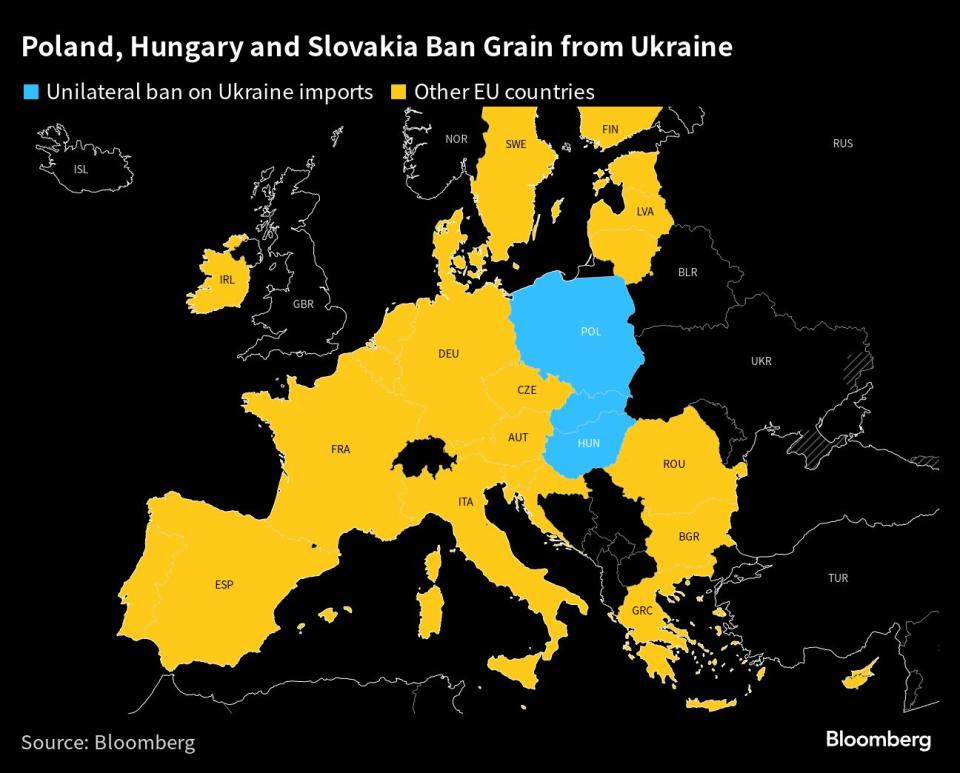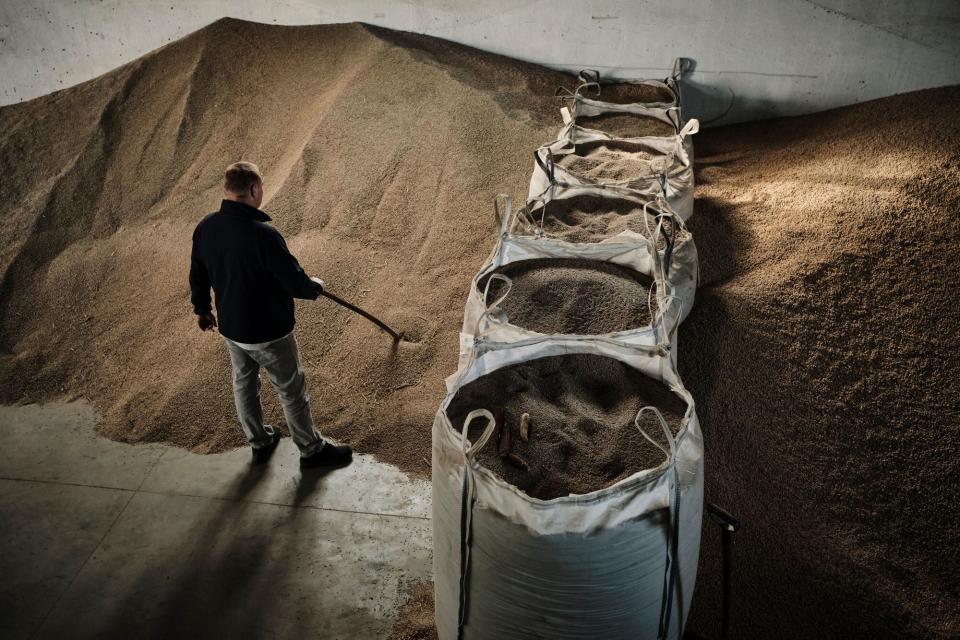Wartime Alliance at Risk as Poland and Ukraine Fight Over Grain
(Bloomberg) -- Poland summoned Ukraine’s ambassador and threatened to expand a grain ban to other imports from its neighbor, escalating a dispute that’s threatening to wreck an alliance key to Kyiv’s fight against Russia.
Most Read from Bloomberg
‘Dead Space’ Co-Creator Departs Startup After Newest Game Flops
Ex-Goldman Bankers Make a Fortune With Controversial Bet on Coal
Passalacqua in Italy’s Lake Como Is Named Best Hotel in the World
Vegas’ Newest Resort Is a $3.7 Billion Palace, 23 Years in the Making
The government in Warsaw reacted to remarks from President Volodymyr Zelenskiy at the United Nations General Assembly on Tuesday in which the Ukrainian leader accused some European Union countries of feigning solidarity with his war-torn nation and appeasing Russia.
While Zelenskiy didn’t single out Poland, his language triggered an angry response there. The ruling Law & Justice party is seething over earlier criticism from Kyiv about its decision to unilaterally extend a ban on Ukrainian grain imports — a move seen as a pre-election appeal to rural Polish voters.
After an initial exchange of barbs between Zelenskiy and his Polish counterpart, Andrzej Duda, on Tuesday, Polish Prime Minister Mateusz Morawiecki threatened to add more products to the grain ban if Kyiv escalates.
“I warn the Ukrainian authorities,” Morawiecki told Polsat news. “We were the first to do a lot for Ukraine, and therefore we expect our interests to be understood. We will defend our interests with all determination.”
The dispute cast into sharp contrast the unity that had defined the relationship between the neighbors before the grain dispute, a friendship that seemed to epitomize western solidarity with Ukraine. Zelenskiy and Duda had regular phone conversations early in the war and in April, Duda vowed alongside Zelenskiy that Russia would never drive the neighbors apart.
But Duda laid into his counterpart on Tuesday in New York, comparing Ukraine’s reaction to the grain ban to that of a drowning man, who “can be extremely dangerous, because he can drag you to the depths” and “drown the rescuers.”
“We cannot allow that Ukrainian grain is sold on the Polish market without any control,” Duda said in an interview Tuesday on Bloomberg Television with Annmarie Hordern in New York. “We also have our own citizens, we have to care for their interest.”
The Polish leader also apparently snubbed Zelenskiy. Duda had planned to meet him on the sidelines of the UN meeting, only to say later that scheduling conflicts made it impossible. Ukrainian officials never confirmed the meeting, according to a person familiar with the protocol, who spoke under condition of anonymity.
The back-and-forth signaled that what seemed to be a relatively minor disagreement has ballooned into something larger. Any worsening could have direct implications for the war, as Poland is the primary destination for refugees and the gateway to about 90% of all the western aid and military equipment headed for Kyiv.
The timing is also a blow to Ukraine, as the war of words flared just as Zelenskiy pressed his case in New York for more global support and Ukrainian forces advance in a grinding counteroffensive to retake occupied territory.
Read More: Ukraine Reaps a Big Harvest, But War Risks Trapping It at Home
For Poland, the issue is a political one. The ruling Law & Justice party, seeking a third term in office in next month’s contest, is reluctant to alienate its rural base while growing discontent over the cost of supporting Ukraine has boosted the party’s opponents on the far right.
Zelenskiy’s allies complain that a promise in April by Morawiecki to avoid a unilateral move on grain was broken by the announcement days later by Law & Justice leader Jaroslaw Kaczynski, according to an official familiar with Kyiv’s thinking. The relationship with Warsaw is now hostage to the election campaign, the official said.
Ukraine responded this week by filing a World Trade Organization complaint against Poland, Slovakia and Hungary.
Read more: Ukraine Files Complaint With WTO on EU Neighbors’ Grain Ban
In addition to serving as a major source of military assistance to Ukraine, Poland has accepted about 2 million refugees from Russia’s invasion. But the Polish government said Monday it may not extend support for the refugees next year.
In the interview, Duda said there were “many different problems,” including “people-to-people problems.”
“But it’s normal, it’s just human,” he said. “A lot of Polish people have sacrificed a lot to help their neighbors from Ukraine.”
Neither side looked ready to back down.
“Personally, I regret there is a discussion going on in the media,” Duda told Bloomberg. “I’ll try to cut it off for sure, because someone needs to be wiser here, and the situation isn’t easy.”
History of Wars
In a historical context, the division is nothing new: Ukraine and Poland have fought wars dating to the 17th century. A commemoration of the 1943 massacres of Poles in the Ukrainian region of Volhynia this year triggered complaints by Law & Justice officials that Zelenskiy should have apologized for the mass killings.
Ukrainian authorities took a dim view, noting that a formula for reconciliation had been agreed on — and that the issue was artificially being raised again in Warsaw by politicians, an official familiar with the discussions said. Zelenskiy joined Duda at a church service to mark the event in July.
“History should be left to historians and experts and the two countries should think about the future,” Ihor Zhovkva, Zelenskiy’s deputy chief of staff responsible for foreign affairs, said in an interview. “We have a lot in common, despite the difficult history. Today, we have more in common than what separates us.”
--With assistance from Natalia Ojewska and Annmarie Hordern.
Most Read from Bloomberg Businessweek
©2023 Bloomberg L.P.

 Yahoo News
Yahoo News 


